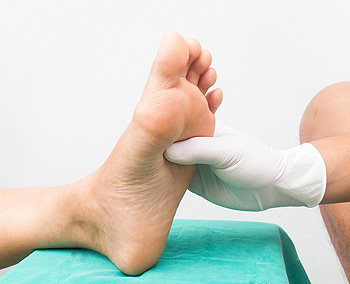Connect With Us
Blog

Runners should include regular stretching in their routine to help prevent injuries and support muscle recovery. The best time to stretch is after a light warmup or following a run, when muscles are more receptive. Stretching improves blood flow, increases flexibility, reduces muscle pain, enhances overall performance, and helps lower physical stress. Key areas to focus on include the feet, ankles, and the Achilles tendon. A podiatrist can assess running form, address any biomechanical concerns, and recommend personalized stretching techniques or orthotics for improved support. If you have sustained a foot or ankle injury from running, it is suggested that you consult a podiatrist who can treat various foot conditions, and guide you on reaching your goals by staying pain-free.
All runners should take extra precaution when trying to avoid injury. If you have any concerns about your feet, contact one of our podiatrists of Advantage Foot and Ankle Center . Our doctors will treat your foot and ankle needs.
How to Prevent Running Injuries
There are a lot of mistakes a runner can make prior to a workout that can induce injury. A lot of athletes tend to overstretch before running, instead of saving those workouts for a post-run routine. Deep lunges and hand-to-toe hamstring pulls should be performed after a workout instead of during a warmup. Another common mistake is jumping into an intense routine before your body is physically prepared for it. You should try to ease your way into long-distance running instead of forcing yourself to rush into it.
More Tips for Preventing Injury
- Incorporate Strength Training into Workouts - This will help improve the body’s overall athleticism
- Improve and Maintain Your Flexibility – Stretching everyday will help improve overall performance
- “Warm Up” Before Running and “Cool Down” Afterward – A warm up of 5-10 minutes helps get rid of lactic acid in the muscles and prevents delayed muscle soreness
- Cross-Training is Crucial
- Wear Proper Running Shoes
- Have a Formal Gait Analysis – Poor biomechanics can easily cause injury
If you have any questions, please feel free to contact our office located in Newark, DE . We offer the newest diagnostic and treatment technologies for all your foot care needs.

Foot and ankle issues are easy to overlook until they begin to interfere with daily life. Pain, swelling, numbness, or visible changes in the skin or nails are all reasons to seek care. A podiatrist specializes in identifying the cause behind these symptoms and creating a treatment plan that fits your needs. Whether it is recurring heel pain, a toenail that keeps growing inward, or a sore that will not heal, early attention can prevent more serious problems. Foot discomfort is not something to ignore or push through, especially if you have conditions like diabetes, arthritis, or poor circulation. Addressing minor issues before they become major ones can protect your mobility and overall well-being. If you are noticing any changes in how your feet feel or function, it is suggested that you schedule an appointment with a podiatrist for a diagnosis and appropriate treatment.
If you are dealing with pain in your feet and ankles, you may want to seek help from a podiatrist. Feel free to contact one of our podiatrists from Advantage Foot and Ankle Center . Our doctors can provide the care you need to keep you pain-free and on your feet.
What Is a Podiatrist?
A podiatrist is a doctor of podiatric medicine who diagnoses and treats conditions of the foot, ankle, and related structures of the leg. Your podiatrist may specialize in a certain field such as sports medicine, wound care, pediatrics, and diabetic care. Podiatrists have the ability to become board certified through training, clinical experience, and then taking an exam.
What Do Podiatrists Do?
On a daily basis, a podiatrist may perform the following activities:
- Diagnose foot ailments such as ulcers, tumors, fractures, etc.
- Use innovative methods to treat conditions
- Use corrective orthotics, casts, and strappings to correct deformities
- Correct walking patterns and balance
- Provide individual consultations to patients
It is very important that you take care of your feet. It’s easy to take having healthy feet for granted, however foot problems tend to be among the most common health conditions. Podiatrists can help diagnose and treat a variety of feet related conditions, so it is crucial that you visit one if you need assistance.
If you have any questions please feel free to contact our office located in Newark, DE . We offer the newest diagnostic and treatment technologies for all your foot and ankle needs.

Proper foot care is essential for individuals with diabetes, as high blood sugar can lead to poor circulation and nerve damage, called neuropathy. This can reduce sensation in the feet, making it hard to notice cuts, blisters, or infections that may worsen over time. Common symptoms include tingling, numbness, dryness, or slow-healing wounds. Feet may appear dry, cracked, or swollen, and unnoticed injuries can quickly lead to serious complications. Daily foot care is key. Wash your feet with mild soap, dry thoroughly, especially between the toes, and moisturize to prevent cracking. Wear well-fitting shoes to avoid pressure points and inspect your feet daily for changes. Trim toenails straight across to prevent ingrown nails. A podiatrist can detect early signs of complications through regular exams and provide treatment such as wound care, nail trimming, orthotics, or footwear recommendations. For ongoing support, it is suggested that you make an appointment with a podiatrist for evaluation and treatment.
Diabetic foot care is important in preventing foot ailments such as ulcers. If you are suffering from diabetes or have any other concerns about your feet, contact one of our podiatrists from Advantage Foot and Ankle Center . Our doctors can provide the care you need to keep you pain-free and on your feet.
Diabetic Foot Care
Diabetes affects millions of people every year. The condition can damage blood vessels in many parts of the body, especially the feet. Because of this, taking care of your feet is essential if you have diabetes, and having a podiatrist help monitor your foot health is highly recommended.
The Importance of Caring for Your Feet
- Routinely inspect your feet for bruises or sores.
- Wear socks that fit your feet comfortably.
- Wear comfortable shoes that provide adequate support.
Patients with diabetes should have their doctor monitor their blood levels, as blood sugar levels play such a huge role in diabetic care. Monitoring these levels on a regular basis is highly advised.
It is always best to inform your healthcare professional of any concerns you may have regarding your feet, especially for diabetic patients. Early treatment and routine foot examinations are keys to maintaining proper health, especially because severe complications can arise if proper treatment is not applied.
If you have any questions please feel free to contact our office located in Newark, DE . We offer the newest diagnostic and treatment technologies for all your foot and ankle needs.

A foot fracture can affect any of the 26 bones in the foot, including the toes, metatarsals, sesamoids near the big toe, and the rearfoot bones such as the navicular, talus, and heel bone. These foot fractures often result from twisting injuries, falls, or direct impact against a hard surface. Pain is usually immediate and worsens when placing weight on the foot. A podiatrist typically diagnoses a fracture using an X-ray to identify the location and type of break. In some cases, additional imaging may be required if the fracture is complex or not visible on standard X-rays. Treatment depends on which bone is fractured and the severity of the break. It often involves wearing a splint, cast, or a protective shoe or boot to stabilize the foot. Weight-bearing may be restricted for several weeks while the bone heals. If you have broken a bone in your foot, it is suggested that you make an immediate appointment with a podiatrist for an exam and appropriate treatment options.
A broken foot requires immediate medical attention and treatment. If you need your feet checked, contact one of our podiatrists from Advantage Foot and Ankle Center . Our doctors can provide the care you need to keep you pain-free and on your feet.
Broken Foot Causes, Symptoms, and Treatment
A broken foot is caused by one of the bones in the foot typically breaking when bended, crushed, or stretched beyond its natural capabilities. Usually the location of the fracture indicates how the break occurred, whether it was through an object, fall, or any other type of injury.
Common Symptoms of Broken Feet:
- Bruising
- Pain
- Redness
- Swelling
- Blue in color
- Numbness
- Cold
- Misshapen
- Cuts
- Deformities
Those that suspect they have a broken foot shoot seek urgent medical attention where a medical professional could diagnose the severity.
Treatment for broken bones varies depending on the cause, severity and location. Some will require the use of splints, casts or crutches while others could even involve surgery to repair the broken bones. Personal care includes the use of ice and keeping the foot stabilized and elevated.
If you have any questions please feel free to contact our office located in Newark, DE . We offer the newest diagnostic and treatment technologies for all your foot and ankle needs.
